Featuring the Light & Dark Sides Of Farming Films
Documentaries On Farming, Sign Me Up!
GMO OMG – 2014
Today in the United States, by the simple acts of feeding ourselves, we are unwittingly participating in the largest experiment ever conducted on human beings. Each of us unknowingly consumes genetically engineered food on a daily basis. The risks and effects to our health and the environment are largely unknown. Yet more and more studies are being conducted around the world, which only provide even more reason for concern. We are the oblivious guinea pigs for wide-scale experimentation of modern biotechnology. GMO OMG tells the story of a fathers discovery of GMOs in relationship to his 3 young children and the world around him. We still have time to heal the planet, feed the world, and live sustainably. But we have to start now!
Food Inc. – 2008
For most Americans, the ideal meal is fast, cheap, and tasty. Food, Inc. examines the costs of putting value and convenience over nutrition and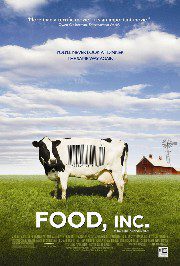 environmental impact.
environmental impact.
Director Robert Kenner explores the subject from all angles, talking to authors, advocates, farmers, and CEOs, like co-producer Eric Schlosser (Fast Food Nation), Michael Pollan (The Omnivore's Dilemma), Gary Hirschberg (Stonyfield Farms), and Barbara Kowalcyk, who's been lobbying for more rigorous standards since E. coli claimed the life of her two-year-old son.
The filmmaker takes his camera into slaughterhouses and factory farms where chickens grow too fast to walk properly, cows eat feed pumped with toxic chemicals, and illegal immigrants risk life and limb to bring these products to market at an affordable cost. If eco-docs tends to preach to the converted, Kenner presents his findings in such an engaging fashion that Food, Inc. may well reach the very viewers who could benefit from it the most: harried workers who don't have the time or income to read every book and eat non-genetically modified produce every day.
 The Botany Of Desire –
The Botany Of Desire –
An eye-opening exploration of the human-plant relationship with author Michael Pollan. Featuring Michael Pollan and based on his best-selling book, this special takes viewers on an eye-opening exploration of the human relationship with the plant world — seen from the plants’ point of view. The program shows how four familiar species (the apple, the tulip, marijuana and the potato) evolved to satisfy our yearnings for sweetness, beauty, intoxication and control.
JIMMY'S GM FOOD FIGHT – 2008
Jimmy Doherty, pig farmer, one-time scientist and poster-boy for sustainable food production is on a mission to find out if GM crops really can feed the world.
We need to double the amount of food we produce in the next fifty years to feed the world's growing population. Are GM crops the answer? Or are they a dangerous Frankenstein technology that could start an environmental catastrophe?
To find the answers Jimmy is on a journey that will take him from the vast soya plantations of Argentina to the traditional Amish farms of Pennsylvania; and from the cutting-edge technology of the GM laboratories to the banana plantations of Uganda.
THE WORLD ACCORDING TO MONSANTO – 2009
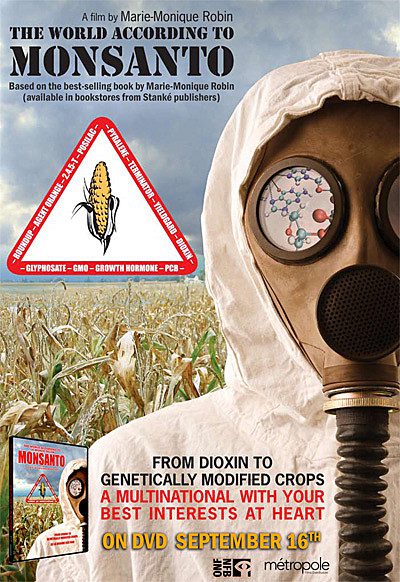 There's nothing they are leaving untouched: the mustard, the okra, the bringe oil, the rice, the cauliflower. Once they have established the norm: that seed can be owned as their property, royalties can be collected. We will depend on them for every seed we grow of every crop we grow. If they control seed, they control food, they know it – it's strategic. It's more powerful than bombs. It's more powerful than guns.
There's nothing they are leaving untouched: the mustard, the okra, the bringe oil, the rice, the cauliflower. Once they have established the norm: that seed can be owned as their property, royalties can be collected. We will depend on them for every seed we grow of every crop we grow. If they control seed, they control food, they know it – it's strategic. It's more powerful than bombs. It's more powerful than guns.
This is the best way to control the populations of the world. The story starts in the White House, where Monsanto often got its way by exerting disproportionate influence over policymakers via the “revolving door”. One example is Michael Taylor, who worked for Monsanto as an attorney before being appointed as deputy commissioner of the US Food and Drug Administration (FDA) in 1991. While at the FDA, the authority that deals with all US food approvals, Taylor made crucial decisions that led to the approval of GE foods and crops. Then he returned to Monsanto, becoming the company’s vice president for public policy.
Thanks to these intimate links between Monsanto and government agencies, the US adopted GE foods and crops without proper testing, without consumer labeling and in spite of serious questions hanging over their safety. Not coincidentally, Monsanto supplies 90 percent of the GE seeds used by the US market.
Monsanto’s long arm stretched so far that, in the early nineties, the US Food and Drugs Agency even ignored warnings of their own scientists, who were cautioning that GE crops could cause negative health effects. Other tactics the company uses to stifle concerns about their products include misleading advertising, bribery and concealing scientific evidence.
KING CORN – 2007
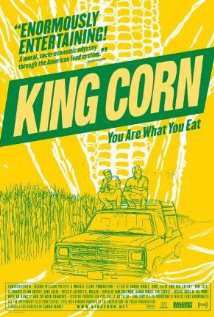 King Corn is a feature documentary about two friends, one acre of corn, and the subsidized crop that drives our fast-food nation. In King Corn, Ian Cheney and Curt Ellis, best friends from college on the east coast, move to the heartland to learn where their food comes from. With the help of friendly neighbors, genetically modified seeds, and powerful herbicides, they plant and grow a bumper crop of America's most-productive, most-subsidized grain on one acre of Iowa soil. But when they try to follow their pile of corn into the food system, what they find raises troubling questions about how we eat-and how we farm.
King Corn is a feature documentary about two friends, one acre of corn, and the subsidized crop that drives our fast-food nation. In King Corn, Ian Cheney and Curt Ellis, best friends from college on the east coast, move to the heartland to learn where their food comes from. With the help of friendly neighbors, genetically modified seeds, and powerful herbicides, they plant and grow a bumper crop of America's most-productive, most-subsidized grain on one acre of Iowa soil. But when they try to follow their pile of corn into the food system, what they find raises troubling questions about how we eat-and how we farm.
THE GARDEN – 2008
From the ashes of the L.A. riots arose a lush, 14-acre community garden, the largest of its kind in the United States. Now bulldozers threaten its future.
THE FUTURE OF FOOD – 2004
There is a revolution happening in the farm fields and on the dinner tables of America a revolution that is transforming the very nature of the food we eat.
The Future of Food offers an in-depth exploration of several important developments in agriculture today including the diminishment of biodiversity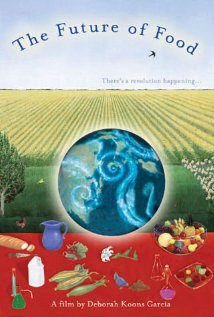 , patenting of life, loss of family farms, consolidation of seed companies and the globalization of our food system. Using genetically engineered crops as a primary cause and result of these new developments, the film delves into the disturbing truth behind the unlabeled, patented, genetically engineered foods that have quietly filled the worlds grocery stores for the past decade.
, patenting of life, loss of family farms, consolidation of seed companies and the globalization of our food system. Using genetically engineered crops as a primary cause and result of these new developments, the film delves into the disturbing truth behind the unlabeled, patented, genetically engineered foods that have quietly filled the worlds grocery stores for the past decade.
From the prairies of Saskatchewan, Canada to the fields of Oaxaca, Mexico, The Future of Food gives a voice to farmers whose lives and livelihoods have been negatively impacted by new, patented GMO seeds. The film uses animation to explain the process of recombinant DNA technology which allows genetic engineering, the movement of DNA from one species to another. The legal foundations for, and consequences of, patenting life are explored in depth. The health implications, government policies and push towards globalization are presented as some of the reasons why many people are alarmed by the takeover of our food supply by corporations and their genetically engineered crops. The global battle over agricultural genetic engineering is as fierce now as ever.
Shot on location in the U.S., Canada and Mexico, and contrasting local trends with global realities, The Future of Food examines the complex web of market and political forces that are changing what we eat as huge multinational corporations seek to control the worlds food system. The film also explores alternatives to large-scale industrial agriculture, placing organic and sustainable agriculture as real solutions to the farm crisis.
OUR DAILY BREAD – 2005
Welcome to the world of industrial food production and high-tech farming! To the rhythm of conveyor belts and immense machines, the film looks without commenting into the places where food is produced in Europe: monumental spaces, surreal landscapes and bizarre sounds – a cool, industrial environment which leaves little space for individualism. People, animals, crops and machines play a supporting role in the logistics of this system which provides our society’s standard of living.
FARMAGGEDON – 2011
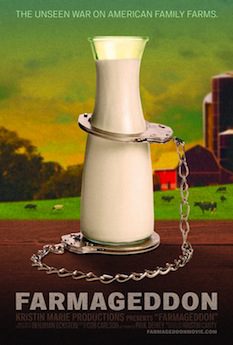 Americans’ right to access fresh, healthy foods of their choice is under attack. Farmageddon tells the story of small, family farms that were providing safe, healthy foods to their communities and were forced to stop, sometimes through violent ac-tion, by agents of misguided government bureaucracies, and seeks to figure out why.
Americans’ right to access fresh, healthy foods of their choice is under attack. Farmageddon tells the story of small, family farms that were providing safe, healthy foods to their communities and were forced to stop, sometimes through violent ac-tion, by agents of misguided government bureaucracies, and seeks to figure out why.
Producer Kristin Canty’s film, Farmageddon, documents as her quest to find healthy food for her four children turns into an educational journey to discover why she is denied the freedom to select thefoods of her choice from the producer of her choice.
The movie tells the story of small, family farmers providing safe, healthy foods to their communities who were forced to stop, often through violent action, by agents of misguided government bureaucracies. The movie succinctly poses and addresses the question “why is this happening in 21st century America?”
Evoking both sympathy and anger for those farmers violently shut down by overzealous government policy and regulators, Farmageddon stresses the urgency of food freedom. Though the film deals with intense scenes and dramatic situations, the overall tone is optimistic, encouraging farmers and consumers alike to take action to preserve individuals’ rights to access food of their choice and farmers’ rights to produce these foods.
As We Sow –
As farmers leave the land in record numbers, agribusiness and the associated industrialization of agriculture continue to expand. The consequences—intended and unintended—of this rapid restructuring of our food system reach well beyond the boundaries of what we think of as “the family farm.” The award-winning documentary short, AS WE SOW, documents the stories of survival and failure in the real heartland, a struggle pitting family against family, neighbor against neighbor, citizens against their government, and small, independent farmers against the giants of global agribusiness. At the center is the land itself: who will control it and how, and at what cost to people and communities, to our health and our environment, and, ultimately, to our democracy.
Symphony of the Soil
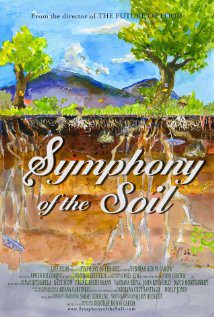 Drawing from ancient knowledge and cutting edge science, Symphony of the Soil is an artistic exploration of the miraculous substance soil. By understanding the elaborate relationships and mutuality between soil, water, the atmosphere, plants and animals, we come to appreciate the complex and dynamic nature of this precious resource. The film also examines our human relationship with soil, the use and misuse of soil in agriculture, deforestation and development, and the latest scientific research on soil’s key role in ameliorating the most challenging environmental issues of our time. Filmed on four continents, featuring esteemed scientists and working farmers and ranchers, Symphony of the Soil is an intriguing presentation that highlights possibilities of healthy soil creating healthy plants creating healthy humans living on a healthy planet.
Drawing from ancient knowledge and cutting edge science, Symphony of the Soil is an artistic exploration of the miraculous substance soil. By understanding the elaborate relationships and mutuality between soil, water, the atmosphere, plants and animals, we come to appreciate the complex and dynamic nature of this precious resource. The film also examines our human relationship with soil, the use and misuse of soil in agriculture, deforestation and development, and the latest scientific research on soil’s key role in ameliorating the most challenging environmental issues of our time. Filmed on four continents, featuring esteemed scientists and working farmers and ranchers, Symphony of the Soil is an intriguing presentation that highlights possibilities of healthy soil creating healthy plants creating healthy humans living on a healthy planet.
David Versus Monsanto – 2009
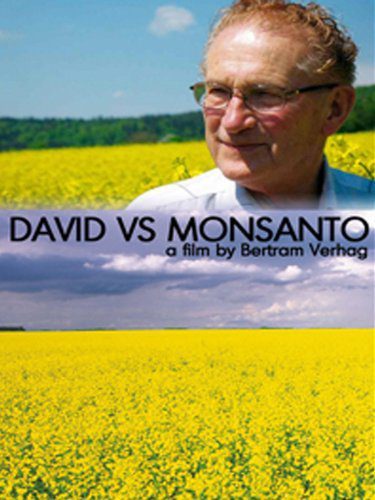 Imagine that a storm blows across your garden and that now, genetically-manipulated seeds are in your crops. A multi-national corporation pay you a visit, demand that you surrender your crops – and then sue you for $200 000 for the illegal use of patented, GM seeds. In this definitive David and Goliath battle, one farmer stands up against a massive multinational, and their right to claim ownership to a living organism.
Imagine that a storm blows across your garden and that now, genetically-manipulated seeds are in your crops. A multi-national corporation pay you a visit, demand that you surrender your crops – and then sue you for $200 000 for the illegal use of patented, GM seeds. In this definitive David and Goliath battle, one farmer stands up against a massive multinational, and their right to claim ownership to a living organism.

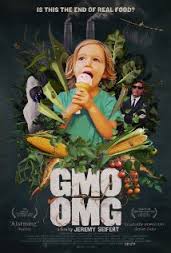
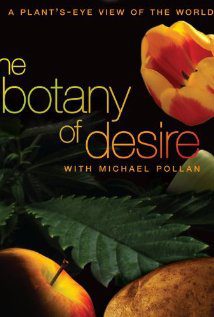 The Botany Of Desire
The Botany Of Desire